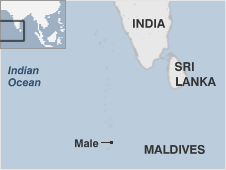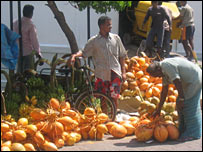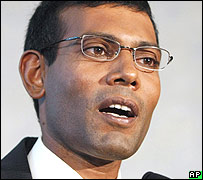 |
The Maldives is made up of a chain of nearly 1 200 islands most of them uninhabited which lie off the Indian sub-continent.
None of the coral islands measures more than 1.8 metres (six feet) above sea level making the country vulnerable to a rise in sea levels associated with global warming.
Overview
With its abundant sealife and sandy beaches The Maldives is portrayed by travel companies as a tropical paradise.

A third of the population lives in the crowded capital
|
The economy revolves around tourism and scores of islands have been
developed for the top end of the tourist market.
Aside from the island capital Male outsiders are only permitted onto inhabited islands for brief visits thereby limiting their impact on traditional Muslim communities.
Many Maldivians live in poverty. However the country has developed its infrastructure and industries including the fisheries sector and has boosted health care education and literacy.
The Maldives was hit by the December 2004 Asian tsunami. Homes and resorts were devastated by the waves precipitating a major rebuilding programme.
There is a fear that as sea levels rise island countries such as the Maldives and some Pacific territories will simply be swamped and disappear.
Facts
- Full name: Republic of Maldives
- Population: 309 000 (UN 2009)
- Capital: Male
- Area: 298 sq km (115 sq miles)
- Major language: Divehi
- Major religion: Islam
- Life expectancy: 70 years (men) 73 years (women) (UN)
- Monetary unit: 1 rufiyaa = 100 laari
- Main exports: Fish
- GNI per capita: US $3 630 (World Bank 2008)
- Internet domain: .mv
- International dialling code: +960
Leaders
President: Mohamed Nasheed
A former political prisoner Mohamed 'Anni' Nasheed was elected in the Maldives' first multi-party presidential elections in October 2008 ending President Maumoon Abdul Gayoom's 30-year autocratic rule.

President Nasheed: Won islands' first democratic elections
|
After falling short of an absolute majority in the first round Mr Nasheed united opposition support in the run-off winning 54% of the vote to Mr Gayoom's 46%.
Mohamed Nasheed had long been at the forefront of efforts to push Mr Gayoom towards democratisation organising the Maldives' main opposition party while exile in Britain.
Before seeking refuge abroad he was repeatedly jailed for his political activities and says he was tortured twice while in prison.
He returned from the UK to the Maldives in 2005 after parliament voted to lift a ban on political parties.
After the election the new president promised a "smooth transition to
democracy" and more freedom as well as action to combat corruption widely seen to have flourished in decades of authoritarian rule.
He has insisted he will not bring corruption charges against his predecessor saying the way Mr Gayoom is treated will be a "test of our democracy".
A new constitution ratified in August 2008 contained provisions for separating the country's executive and legislature and enshrined a bill of rights. It also provided for the country's first multi-party presidential elections to take place.
The challenges facing the new president also include threats to the largely tourism-based economy posed by the global credit crisis a widespread drugs problem and growing radical Islamist activity.
Born in 1967 Mr Nasheed was educated in Sri Lanka and Britain and has a degree in maritime engineering.
Media
The government operates Voice of Maldives radio and Television Maldives. The first private radio station opened in 2007 and a handful of private TV stations have been licensed.
Media rights group Reporters Without Borders describes radio licence charges as exorbitant. Minivan Radio an opposition station operates via the internet.
Divehi-language dailies tend to include English-language pages. They concentrate on local and regional stories.
Broadcasters and newspapers carry criticism of the state but officials have powers to close media outlets. Self-regulation means that little official action is taken against journalists.
In April 2009 President Nasheed pledged to deregulate the media and ensure press freedom and competition.
The press
- Haveeru Daily Online - English-language pages
- Aafathis News
- Miadhu News - English-language pages
Television
Radio
- Voice of Maldives - state-run also operates entertainment-based Radio Eke and music-based RFM
- Capital Radio 95.6 - private carries some BBC World Service programmes
- HFM 92.6 - private
- DhiFM 95.2 - private
Internet
-
Minivan News - private
AFRICA | ASIA-PACIFIC | AMERICAS | EUROPE | MIDDLEEAST | SOUTHASIA
Mauritania Mauritius Morocco Mozambique Namibia Niger Nigeria Republic-of-congo Rwanda Sao-tome-and-principe Senegal Seychelles Sierra-leone Somalia South-africa Sudan Swaziland Tanzania The-gambia Togo Tunisia Uganda zambia Zimbabwe Australia Brunei Burma Cambodia China East-timor Fiji Indonesia Japan Kazakhstan Kiribati Kyrgyzstan Laos Malaysia Marshall-islands Micronesia Mongolia Nauru New-zealand North-korea Palau Papua-new-guinea Samoa Singapore Solomon-islands South-korea Taiwan Tajikistan Thailand The-philippines Tonga Turkmenistan Tuvalu Uzbekistan Vanuatu Vietnam Antigua-and-barbuda Argentina Bahamas Barbados Belize Bolivia Brazil Canada Chile Colombia Costa-rica Cuba Dominica Dominican-republic Ecuador El-salvador Grenada Guatemala GuyanaHaiti Honduras Jamaica Mexico Nicaragua Panama Paraguay Peru St-kitts-and-nevis St-lucia St-vincent-and-the-grenadines Suriname Trinidad-and-tobago United-states-of-america Uruguay Venezuela Albania Andorra Armenia Austria Azerbaijan Belarus Belgium Bosnia-hercegovina Bulgaria Croatia Cyprus Czech-republic Denmark Estonia Finland France Georgia Germany Greece Hungary Iceland Ireland Italy Latvia Liechtenstein Lithuania Luxembourg Macedonia Malta Moldova Monaco Montenegro Norway Poland Portugal Russia San-marino Serbia Slovakia Slovenia Spain Sweden Switzerland The-netherlands Turkey Ukraine United-kingdom Vatican Algeria Egypt Iran Iraq Israel-and-palestinian-territories Jordan Kuwait Lebanon Libya Mauritania Oman Saudi-arabia Sudan Syria Tunisia United-arab-emirates Yemen Afghanistan Bangladesh Bhutan India Nepal Pakistan Sri-Lanka The-Maldives

